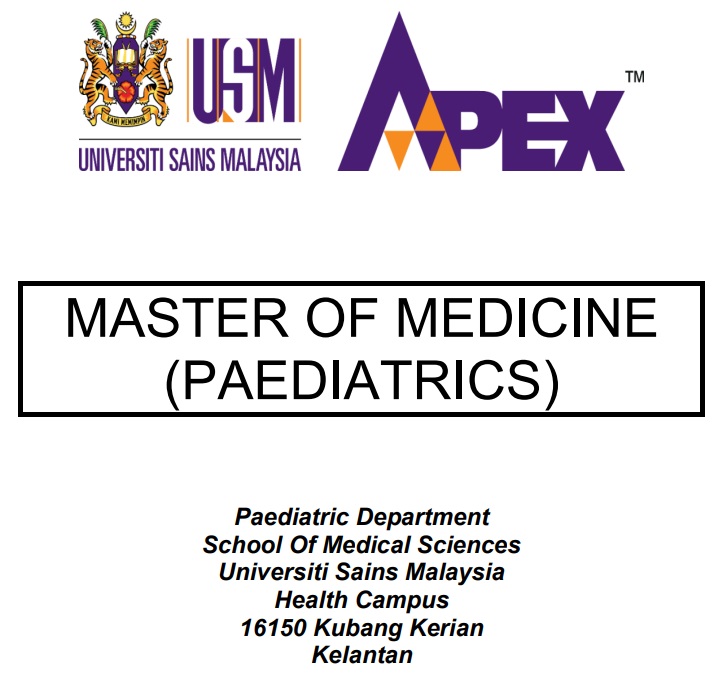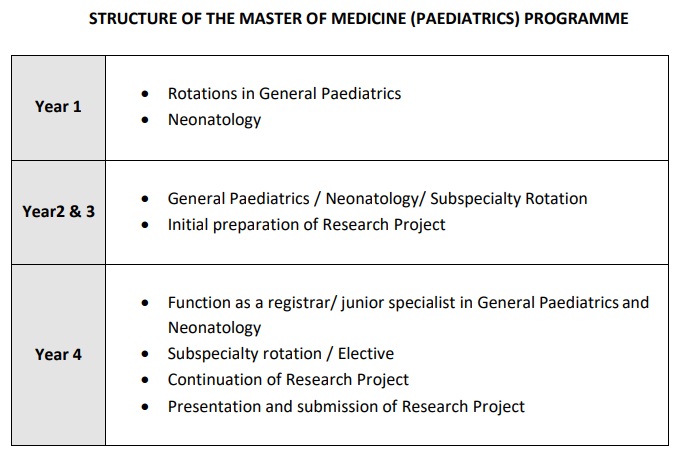Postgraduate

MASTER OF MEDICINE (PAEDIATRICS)
1. Objective
The philosophy of our postgraduate programme is to provide training by apprenticeship and learning from patients with emphasis on self-directed learning for a duration of 4 years.
2. Background
The School of Medical Sciences was established in 1979 to cater for the need of undergraduate training. Since 1988, the School of Medical Sciences has embarked on postgraduate medical training and have so far produced specialist in various clinical specialties to meet the need of the country. The training programme are conducted by coursework and currently there are eighteen postgraduate specialist training programme.
3. Entry requirements
- MMC registration certificate (Temporary Practicing Certificate)
- Documentation of housemanship training or its equivalent
- Evidence of English language proficiency (IELTS 7 or equivalent) for international trainees
- A certified report showing proof of completion of 4 months of paediatric posting as a House-officer or medical officer
- Documentation of successful completion of ALL required Paediatric Entrustable Professional Activities/ Essential Learning Activities - EPAs/ELAs (please refer to MOH website – Medical officer career development)
- Evidence of passing the Malaysian Paediatric Entrance Examination (MEDEX) OR MRCPCH part 1b OR 2a within the last 5 years prior to application
4. Structure of course

Before completion of the programme, the candidate has to attend courses (with certificate of completion):
- Recognised neonatal resuscitation programme trainer.
- Recognised advanced paediatric life-support provider
- Basic Statistics and research methodology course (organized by the respective universities)
Before completion of the programme, the candidate is recommended to attend the following courses:
- Communication/ Soft Skills
- Bioethics
- Scientific writing
- Clinical Practice course (organized by the respective university or Clinical Research Centre [CRC] Malaysia
5. Duration of study
1. The duration of study will be four (4) full years as a full-time student.
2. The maximum duration of study shall not exceed seven (7) years.
6. Formative assessments
Candidates must keep a portfolio/logbook as an evidence of their formative assessments which need to be submitted 3 monthly.
Types of formative assesments
- Overall supervisor report
- Case- based discussion (CBD)
- Mini clinical evaluation exercise (MiniCEX)
- Directly Observed Procedural Skills (DOPS)
- Sheffield Instrument for Letters (SAIL)
- Multi Source Feedback (MSF) • Safeguarding Children Case-Based Discussion
7. Examination formats
Part I Examination (Conjoint examination) consists of a theory paper which is divided into Paper 1 and Paper 2
Paper 1
- Multiple choice questions (MCQ)
- One Best Answer (OBA) • Extended Matching Item (EMI)
Paper 2
- Long Modified Essay Question (MEQ)
- Short Modified Essay Question (MEQ)
- Slides
Part 2 Examination is a conjoint clinical examination which has 5 components
- Classical Long Case
- Observed Long Case
- Short Cases
- Communication
- Emergency Paediatrics
8. RESEARCH PROJECT
- The objective of the research project is to introduce the candidate to research methodology, data analysis and journal writing.
- The project must be conducted according to guidelines approved by the respective university.. • The research report may be submitted as a journal publication or dissertation book.
DOCUMENTS FOR DOWNLOAD
{phocadownload view=filelist|id=31|limit=20}